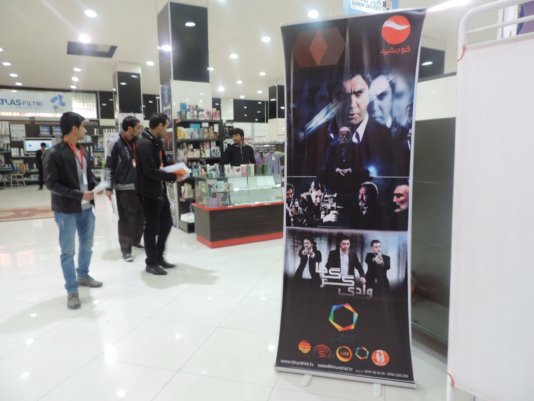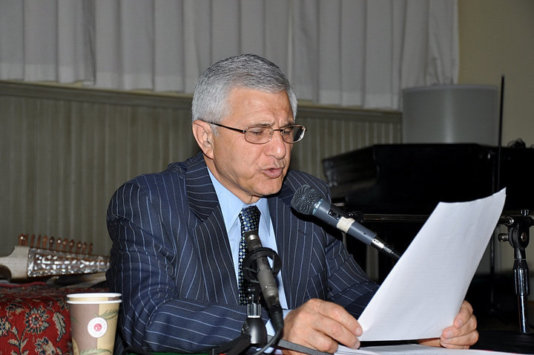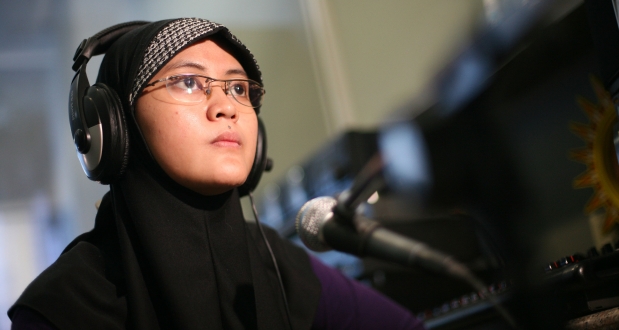- About
- Topics
- Picks
- Audio
- Story
- In-Depth
- Opinion
- News
- Donate
-
Signup for our newsletterOur Editors' Best Picks.Send
Read, Debate: Engage.
| June 09, 2015 | |
|---|---|
| topic: | Freedom of Expression |
| tags: | #Afghanistan, #entertainment industry, #Muslim society, #religion, #RTA, #soap opera |
| located: | Afghanistan |
| by: | Shadi Khan Saif |
Generous foreign funding and the relative peace of the past decade has helped the media industry flourish in this rather conservative Muslim society that has been witnessing armed conflict for nearly four decades now.
In the past 14 years, the numbers of television channels have soared from one state-owned Radio Television Afghanistan (RTA) channel to around one hundred terrestrial and satellite channels. So, is the case with radio stations, print and social media.
Afghanistan has always had its problems with limitations in regard to independent local production, especially when it comes to women, romance and other liberal values. An easier way to find a way round this and being able to meet the growing demand for entertainment, many TV channels have opted to import serials mainly from India, Turkey, Iran and the U.S.
Despite the phenomenal popularity of many of these soap operas, a rather influential segment of the society strongly opposes it.
Religious leaders, not just in the far away provincesbut in the capital Kabul as well, have warned the channels about consequences if they continue airing foreign plays, movies and shows.
Qayamuddin Kashaaf, head of the Kabul Ulema (religious scholars’) Council viewed these serials as a tool of propagating Hinduism and western values in the predominantly Muslim country. The council had repeatedly presented its standpoint to the president and the information ministry, he claimed.
"We have repeatedly asked the Ministry of Information and Culture to stop those (TV channels) airing foreign soaps and musical concerts but ministry is taking no action." he told FairPlanet.
This however, might change as the newly appointed minister for information and culture has expressed clear intention to act in this regard.
Abdul Bari Jehani, a renowned Afghan broadcaster and the author of national anthem resumed charge of the ministry two weeks ago.
“Instead of airing meaningless plays that fuel family and other kinds of disputes in our society, people should be offered with constructive programs that are not in contravention of Islamic and Afghan values,” he told journalists in a gathering.
He underlined the need for entertainment programs aimed at educating and enriching the younger generation.
“A commission would soon be formed to identify programs that are against our values”, he hinted.
There is however, a bright side to these imported plays. Raging wars have denied Afghans the exposure to rest of the world for decades. Some people in the entertainment industry argue that the country can simply not afford to close itself but obviously should take care of its values.
Humayoun Sakhi, an independent producer told FairPlanet that local entertainment industry was faced with various technical and other obstacles, including the financial crunch in the wake of shrinking foreign aid hence cutting-off the already limited means of entertainment cannot be justified.
“I understand that our people have been negatively affected influenced by some of the foreign plays but we too are to be blamed for our short sightedness, we have not educated our people enough to resist the cultural invasion”, he said.
Sakhi went on to say that at the moment, there existed no institutional support or enabling environment for that matter to make the Afghan entertainment industry stand on its feet.
On the other side, the foreign plays have created so many jobs for the middle class educated individuals. The plays are translated and adapted into local Pashto and Dari languages that means bread and butter for translators, voice artists, composers and liner editors.
As the television industry in this war-torn country enters the digital age, the debate about whether to ban foreign soap operas or not might just take a new dimension.
A month ago, a private firm OQAAB launched the country’s first digital terrestrial television services.
With a multi-million dollar investment in infrastructure and personnel, the firm has launched the service initially in Kabul, to be followed shortly by subsequent service launches in 20 provincial capitals within the next three years.
In order to access the service, TV viewers need only buy a low-cost, light-weight Oqaab DVB-T2 receiver that would enable them to surf through around one hundred local and international channels without worrying about the government banning their favorite soap opera.
By copying the embed code below, you agree to adhere to our republishing guidelines.


